Our Graduates
Our Graduates
-
Law
English majors choose legal careers more than any other path. Of those who pursue graduate education, at least one-third attend law school. The skills listed as most important by the American Bar Association are the very ones you will develop by majoring in English. More information is available here.
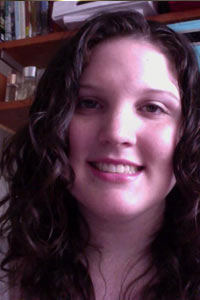 "The real strength of the English department at BSC comes from the interdisciplinary nature of the college itself, which is reflected in the English curriculum."
"The real strength of the English department at BSC comes from the interdisciplinary nature of the college itself, which is reflected in the English curriculum.""I credit my time at Birmingham-Southern both with developing my analytical reading and writing skills and with giving me exposure to a broad range of perspectives and ideas."
Kortni Hadley, Class of 2012
New York University School of Law (class of 2015)I went directly from Birmingham-Southern to New York University School of Law, where I am currently a 2L in the AnBryce Program, which is a scholarship program for first-generation law school students. I credit my time at Birmingham-Southern both with developing my analytical reading and writing skills and with giving me exposure to a broad range of perspectives and ideas, both of which I have found essential in law school generally and in my pursuit of a career in legislative policy specifically.
I feel that the real strength of the English department at BSC comes from the interdisciplinary nature of the college itself, which is reflected in the English curriculum. English students are not just taught how to read and write, but we are taught to consider broader social, historical, and cultural contexts both within the literature itself and in the situations that produced it. In classes I found myself considering the experiences of Native Americans in the United States with Dr. Sprayberry; exploring the field of performance theory for the first time with Dr. Klein; and writing my senior thesis, under the supervision of Dr. McInturff, about how cultural changes over time have led to different performances and interpretations of Hamlet.
Outside of the classroom, the faculty was always available to help me further develop ideas that had caught my interest during class. Dr. Tatter was kind enough to be the faculty sponsor for my honors project on English landscape gardens, a topic I became interested in when taking his class Literature and Arts. Dr. Ashe, who was my faculty advisor, was instrumental in helping me hone my writing skills. He was always available, along with Dr. Hagen and other members of the English faculty, to discuss my goals both in English and for my future as they evolved and sometimes shot off in entirely new directions.
The skills I learned at BSC have transferred into my legal career in important ways. During my 1L summer I had the opportunity to work at the New York Unaccompanied Immigrant Children Project at Fordham Law School's Feerick Center for Social Justice. I was able to put the skills I learned at BSC to good use in legal research and writing and in drafting language for a conceptual type of task force for a model statute, and when the summer ended I was invited to continue working for the Project during the school year. Since then I have been working closely with the Project's director and a group of other legal experts to draft a report for the family court judges of New York, and I have been given independent assignments to research and write legal memoranda on a variety of subjects, including health care access and labor and employment issues for immigrant children. I was also selected by way of a writing competition to be a staff editor on the NYU Journal of Legislation and Public Policy.
Birmingham-Southern was my first stop in a hopefully successful career, and I feel like my experiences there have been invaluable to my success at NYU and beyond. The English department and its faculty truly care about teaching students how to think instead of what to think. My experience at BSC challenged what I thought I knew about literature and about myself as a student, and that process has led me to where I am now and has also given me the tools to be successful here.
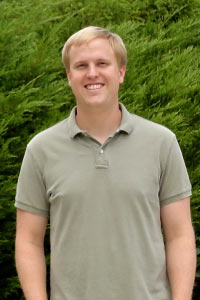 "Being comfortable with uncertainty, a key part of my English education, serves me well in a field that is more often fluid and nebulous than black and white."
"Being comfortable with uncertainty, a key part of my English education, serves me well in a field that is more often fluid and nebulous than black and white."Scott Shelton, Class of 2010
Northwestern University School of LawScott Shelton is a second-year law student at Northwestern University School of Law where he is a staff member for the Northwestern Law Review, an Academic and Professional Excellence Advisor for incoming law students, and the Secretary of Operations for the American Constitution Society. He will spend next summer as a summer associate at Covington & Burling, LLP in Washington DC. After law school graduation, he hopes to serve as a federal judicial law clerk before returning to private practice.
My courses at BSC helped me develop a keen eye for detail, an interest in the interpretation of language, and strong analytic writing skills all of which have served me well so far. I believe that the training I received as an English major makes it much easier to approach and analyze the complex judicial and statutory language that can make much of law school so daunting. Reading an opinion by Justice Holmes is a breeze after spending an entire semester wrestling with Chaucer's The Canterbury Tales in the original Middle English.
I credit the professors at BSC for instilling in me a deep comfort with uncertainty. A comfort that is important to my legal education not only because the law is often more fluid and nebulous than it is black and white, but also because uncertainty creates room for empathy, and empathy is essential to being a legal advocate.
During my time at Birmingham Southern, I was a member of the English honor society, Sigma Tau Delta. I also had the chance to serve as a teaching assistant for Dr. Cowan's Survey of American Literature course. I am very thankful for all of the opportunities, guidance, and training I received as an English major at BSC, and believe that my experience has provided me with an excellent context and a fantastic skill set for pursuing a legal career.
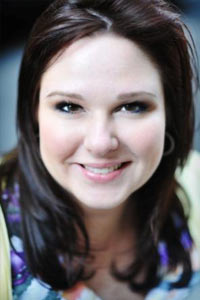 "The team at BSC gave me the tools to stretch, grow and design a wonderful life – living outside of the box and even creating some new boxes along the way."
"The team at BSC gave me the tools to stretch, grow and design a wonderful life – living outside of the box and even creating some new boxes along the way."Ryanne Saucier, Class of 2002
Mississippi Public Broadcasting
Deputy Exec. Director for Contracts and Support ServicesIn 2011, Ryanne was published by the American Bar Association in a book titled Entertainment Law for the General Practitioner on the topics of film and music licensing, making her one of the youngest attorneys published by the American Bar Association on the topic of entertainment law. A cum laude graduate from Mississippi College School of Law, she was selected by professors at Mississippi College School of Law as the Most Valuable Entertainment Person of the Year. Ryanne received the American Jurisprudence Award for the class focusing on the law surrounding Trademarks and Unfair Competition. In addition, she is an associate member of The National Association of Recording Arts and Sciences – Memphis Chapter, the group who gives out the GRAMMY© awards.
Out of the box. Even as I type it, I know my former English professors at Birmingham-Southern College are cringing at my choice of such an overused cliché phrase, but I just cannot help it. It is true and how I describe my experience at Birmingham-Southern, especially with the English department.
The skills I learned were vital to my becoming an intellectual property/entertainment attorney. As a self-diagnosed Type A personality, I struggle with being out of the box. I find comfort in rules and the parameters the box gives me. Now, that's not to say that I won't decorate the inside of the box, strategically hanging some great paintings and throwing a decorative couch in the corner, but for the most part I thrive in procedure, rules and structure. My love of rules led me to law school after graduating from BSC and a rewarding career in the entertainment industry.
My career has varied outside of the normal "legal box," working in areas of artist management, radio programming, concert planning, artist promotion and film production. I currently serve as the Deputy Executive Director over Contracts and Support Services for the PBS and NPR affiliate at Mississippi Public Broadcasting (MPB), which serves the entire state of Mississippi.
My day-to-day activities include overseeing the intellectual property rights, drafting all licensing and contracts entered into and making sure the agency complies with federal regulations with the Federal Communications Commission. Prior to joining MPB, I practiced entertainment law working with musicians, writers, filmmakers, and broadcasters in the areas of music licensing, music publishing as well as copyright, trademark and media law.
I also regularly get the opportunity to lecture to different groups, sharing my love and knowledge on the topics of intellectual property related to the entertainment industry. The team at BSC gave me the tools to stretch, grow and design a wonderful life – living outside of the box and even creating some new boxes along the way.
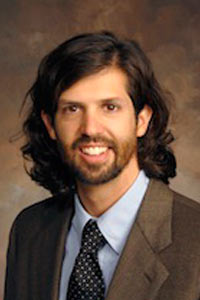
Anil Mujumdar, Class of 1997
Special Counsel for Adams and Reese, LLCOne of many English majors to be active in student government, Anil served as Birmingham-Southern's SGA president and as as a Student Senator at the University of Alabama during his graduate studies. He later joined the board of the ACLU of Alabama and has served as its president since 2006. Anil continues to show his devotion to BSC through the alumni association and by serving on the college's Norton Board of Advisors.
More recently, Anil was recognized in the 2012 "Alabama Super Lawyers listing.The Birmingham Business Journal chose Anil as one of Birmingham's "Top 40 Under 40" for 2013. When asked about the best advice he had ever received, he told the Journal, "An experienced and accomplished lawyer I formerly worked with once told me, 'It is important to understand people.'"
-
Health Sciences
Our graduates enter a wide variety of health related fields: medicine, nursing, dentistry, medical research, and public health. In its most recent reformulation of the MCAT, the Association of American Medical Colleges has added a new section on Critical Analysis and Reasoning Skills. "And the new Critical Analysis and Reasoning Skills section reflects the fact that medical schools want well-rounded applicants from a variety of backgrounds" (from aamc.org). In addition, medical schools are beginning to offer courses in "Narrative Medicine." These moves confirm what we've known for a long time--that the training one receives as an English major will manifest itself in unexpected places.
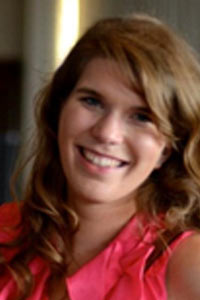 "I think my choosing to couple a BSC English degree with my pursuit of medicine was one of my wisest choices."
"I think my choosing to couple a BSC English degree with my pursuit of medicine was one of my wisest choices."Nona Nichols, Class of 2013
Medical Student
University of Alabama School of MedicineThroughout my undergraduate career and even now, answering the question, "Oh, so what are you majoring in?" has always been a bit of an eyebrow-raiser considering my ambition to become a doctor. Even after getting accepted into UASOM, people seem a little confused. However, I think my choosing to couple a BSC English degree with my pursuit of medicine was one of my wisest choices.
Courses I took at BSC and the discussions I had with professors and peers, both in and out of class, have really helped me when trying to understand humanity as a whole and how to better relate to people—as well as remembering that there is always another side to every story. Dr. Sprayberry's Native American Literature and Dr. Archer's Contemporary International Fiction classes both challenged me to think from viewpoints I hadn't previously considered as well as to try and understand cultures far different from my own. This push to understand others, particularly those from different backgrounds, is fundamental to practicing medicine and working with those who are disenfranchised in today's society.
Theory classes, like Dr. Ashe's Postmodernism and Dr. Klein's Performance Theory, challenged me to more deeply consider the world as a whole around me and have been fundamental in helping me to be a conceptual, concerned thinker by challenging me to consider and analyze deeper implications for all matters in today's world, particularly the all-important and ever-debated ethical considerations, which are so important in medicine.
Dr. Hagen's Chaucer, Dr. Tatter's Satire, and McInturff's Shakespeare courses revealed to me how little human nature has changed, despite the hundreds of years between writing we studied and present day. In doing so, the courses revealed inherent truths about our society and the world we live in today.
Most invaluably BSC's English department gave me space to think about things—to contemplate things deeper than simply memorizing a list of facts—and this opportunity has given me a much greater appreciation and greater consideration for all people and matters of the world around me. At UASOM, I am pursing a dual degree—a Master's of Public Health along with my medical degree. My desire to pursue this additional degree (MPH) has stemmed partially from my experiences in the English department through which I realized that I not only wanted to practice medicine but also wanted to help shape the practice of medicine. Ultimately, I feel as though this more humanities-centered approach will help me to be an excellent doctor for my patients, and I feel extremely indebted to BSC's English department for helping me to grow.
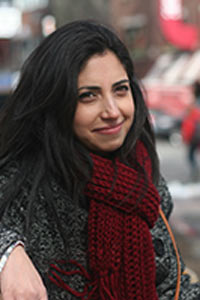 Saman Khaled, Class of 2003
Saman Khaled, Class of 2003
Postdoctoral Research Fellow
Harvard Medical SchoolDuring her time as a graduate student at UAB's Department of Pathology, Saman participated in NASA's highly competitive Space Radiation Summer School Program. Subsequent to this experience, she helped develop tools for measuring the effects of cosmic radiation on the arteries of astronauts.
I graduated from BSC with a major in English literature and went on to get my PhD in Molecular and Cellular Pathology at UAB. I'm now a Postdoctoral fellow at Harvard Medical School and Massachusetts General Hospital in Radiation Oncology. My research is focused on creating more personalized radio- and chemotherapeutic options for patients by developing new assays. In my spare time I'm the technical consultant on a teen web series called Swivet Zone.
The common thread in my scientific career has been developing techniques to provide a dynamic picture of cellular life: the kinetics and the way cells interact with their environment. I love working in a team and problem solving the minutia of science as well as stepping away from it all to discuss the big picture.
-
Communications
As you might expect, a large number of our graduates, about one in eight, enter careers in communications, including journalism, editing, and advertising. Many students take advantage of internships with local publishers, while others work on our student newspaper The Hilltop News, our literary journal Quad, or the Leadership Studies annual publication The Compass. In the classroom and out, English majors hone their writing skills; and our graduates credit those skills with helping distinguish themselves from competitors in the job market.
 "I had experience writing both creatively and academically about the environment, thanks to professors who gave me free rein to explore my science interests in the English classroom."
"I had experience writing both creatively and academically about the environment, thanks to professors who gave me free rein to explore my science interests in the English classroom."Meghan McDonald, Class of 2008
Writer at the Shelton GroupAs a copywriter for Shelton Group, a communications agency focused solely in the sustainability and energy efficiency sectors, Meghan McDonald melds two loves — and her English major and Environmental Studies minor from Birmingham-Southern.
I've taken a few turns along the career path, figuring out different ways to combine writing and a passion for the environment. My M.A. in creative writing from the University of Tennessee caught Shelton Group's attention during the job application process, but my degree from BSC has made the difference for me there.
All our creative work is based on research. I had experience writing both creatively and academically about the environment, thanks to professors who gave me free rein to explore my science interests in the English classroom (thanks Fred Ashe!), but even more importantly, I've been prepared to critically and creatively re-interpret agency research into ideas for client websites, educational materials, ads, and more. I also do my own research to write articles for the agency's online marketing publication. In both contexts, my task is to distill often complex, specialized information into emotionally compelling, practical messages.
The gift for me in this work is that everything I write is a dialogue with my audience, sharing with them a message that means something to me. Everything I write has potential, even if it's small, to spark thought, to spark action that's more responsible toward our world.
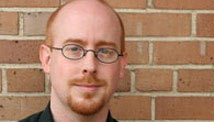 Kyle Whitmire, Class of 2002
Kyle Whitmire, Class of 2002
Local Government and Politics Reporter
The Birmingham NewsSince his days editing the Hilltop News, Kyle has been a mainstay of local journalism, helping to form the new, 21st century media landscape in Birmingham. As a "stringer" for The New York Times, Kyle has contributed to and written stories for national, business, arts and sports desks. Of particular note, he helped cover stories in Alabama, including the trials of Richard Scrushy and Don Siegelman, as well as the Jefferson County financial collapse and bankruptcy. Today he works as the government and politics reporter for the Alabama Media Group.
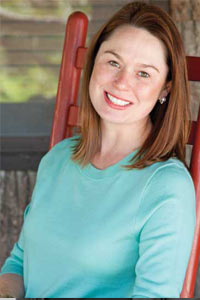
Brooke Bell, Class of 2001
Editor, Taste of the South magazineBrooke Bell is the editor of Taste of the South, a fast-growing magazine that preserves the past and celebrates the future of Southern food. As editor, Brooke directs the editorial staff and is responsible for the planning and executing of all the content for the magazine. She also partners with the test kitchen staff and photography team to develop the recipes and images in every issue.
It was during my senior Interim trip to Italy with professors Samuel Pezzillo and Michael McInturff when I discovered my passion for food and decided to pair it with my journalism career path. It took a few years of culinary school, a 5-year run as a managing editor for outdoor magazines, and writing about food for anyone who would (or wouldn't) pay me to finally put the two together. I joined Hoffman Media in 2007 as the food editor of Cooking with Paula Deen. Today, I am the editor of Taste of the South magazine and the editorial director of Louisiana Cookin' magazine. My advice to students: do what you love, and you'll never work a day in your life.
-
Teaching
Although outnumbered by attorneys, the number of educators among our alumni is considerable, close to 18%. About half of these go into secondary education--either with a post-graduate degree in Education or through our collaborative program with BSC's Education department: the degree in English Language Arts. The other half go on to complete MAs and PhDs and teach at the college level (in English and other disciplines).
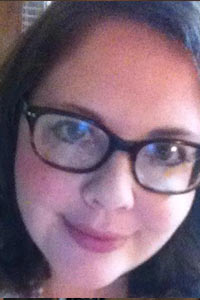 "The English Department gave me the space to grow intellectually and develop my ability to rationally and critically examine issues from a variety of perspectives."
"The English Department gave me the space to grow intellectually and develop my ability to rationally and critically examine issues from a variety of perspectives."Charlsie Wigley, Class of 2011
MEd. Candidate at the Peabody College of Education
Vanderbilt UniversityAfter completing two years as Teach for America Corps member, Charlsie is now a graduate student at Vandy's top-ranked Peabody College where she will complete her MEd. in Secondary English Education.
When I arrived at Birmingham-Southern, I had many passions, including English, but was unsure of a specific career path. Looking back, I can pinpoint where I am today as a result of a choice I made as a freshman to take Dr. John Tatter's Literature and the Social Experience course. The readings, discussion, and field experience of this class prompted me to join other service-learning and leadership studies courses, interims, and experiences that have significantly shaped and altered my views on teaching and education.
Now, after working with nearly 150 8th graders in Greenville, Mississippi through Teach for America (TFA), I have two years teaching English under my belt and am pursuing my Masters in Secondary Education at Vanderbilt's prestigious Peabody College. Recently, my former students posted gains in reading growth on the MCT2 (Mississippi's state assessment) and were recognized as having the highest test scores for the district. More importantly to me, I still communicate with many of my students on a weekly basis and am blessed to see the many ways literacy has taken root in their lives.
Aside from a challenging curriculum, the English Department gave me the space to grow intellectually and develop my ability to rationally and critically examine issues from a variety of perspectives. This has proved invaluable as a middle school teacher for I am daily navigating and managing conflicts among students, staff, parents, and the community.
Additionally, the rigor and interdisciplinary background of my BSC courses provided me with the content knowledge needed to not only teach the basic tenets of literature, but, more importantly, to teach intellectual possibilities created by and through the study of literature. This has proved valuable not only with students, but also with coworkers and bosses who still come to me with all their professional editing needs.
Perhaps the greatest BSC takeaway I still thank my lucky stars for is the strong sense of community housed in and beyond its gates. The BSC faculty and staff go to great lengths to ensure that their students realize their potential. In fact, following my time in TFA, Professor Kent Andersen was the first to encourage me to look at the M.Ed. at Vanderbilt and supported me throughout the application process. You don't get that support in most higher ed. institutions, and, in my opinion, that's what sets BSC apart from the rest. If I am ever half the teacher for my students that BSC faculty and staff were for me, then I will know that I have made a positive footprint on my community.
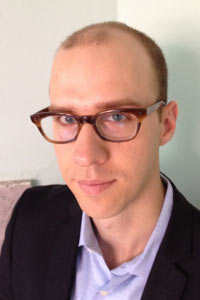 Nicholas Gaskill, Class of 2003
Nicholas Gaskill, Class of 2003
Assistant Professor of English
Rutgers UniversityAn English major at BSC, if taken seriously, can introduce you to questions that are too big to settle, once and for all, while you're still on the Hilltop. After graduating from BSC in 2003, I decided that I would keep pursuing some of the questions I'd developed in my English and Philosophy classes by attending graduate school (but only after taking a year to teach ESL in Hungary). I studied nineteenth- and early-twentieth-century American literature and culture the University of North Carolina at Chapel Hill, receiving my Ph.D. in 2010. From there, I took a postdoctoral fellowship in the Society of Fellows at the University of Chicago, where I taught just about everything but American literature, including Homer and Plato, Dante and Augustine, Shakespeare and Kant.
After eight years, I got a "real job" as an assistant professor in the English Department at Rutgers, New Brunswick. Here, I teach courses on nineteenth- and twentieth-century American literature, pragmatism and aesthetics, and literature and visual culture. I also write about these topics and have published several essays on them in peer-reviewed journals. In 2014, my co-edited volume of essays on Alfred North Whitehead will be published by an academic press; it's no stretch to say that this collection would not have come about without the courses and conversations I enjoyed as an English major at BSC.
-
Business/Marketing
More than one in ten of our graduates go into business--some as entrepreneurs; some as bankers or insurance executives. As the wordsmiths of the business world, many directors of marketing and promotions get their start as English majors. Whether in the private sector or non-profit organizations, fundraising and development work starts with critical thinking and writing. Knowing how to communicate clearly and persuasively is also an asset to our alumni in real estate, sales, and business management.
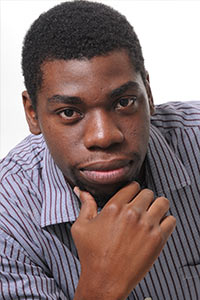
"The English major, with its emphasis on the techniques of critical reading and logical, coherent structuring of information, sets students up to succeed tremendously in the professional world."
O'Bryan Hewitt, Class of 2011
MA Candidate in International Economics & Finance
University of Queensland, AustraliaI graduated from Birmingham-Southern College in 2011 with a double major in English Literature and Business Administration. I am currently in the midst of my Masters in International Economics & Finance at the University of Queensland. I think the most valuable skill I have is one I developed extensively at BSC--and that's critical thinking. The English major, with its emphasis on the techniques of critical reading and logical, coherent structuring of information, sets students up to succeed tremendously in the professional world.
Soon I will be entering the profession of management consulting. Simply put, a management consultant is one who solves business problems for their client. For the most part, the business knowledge can be learned on the job--and most management consulting firms know this and thus accept applications from all disciplines–but critical thinking is a skill employers expect as a prerequisite. And it is one that the English major fully prepares its students to have upon graduation.

Molly Griffin, Class of 2004
Owner, Miss Moxie
Fashion Consulting ServiceMiss Moxie, a personal shopping and wardrobe styling business, was created out of a passion rooted in making others feel beautiful. The foundation of my business is designed to bring love, life, and laughter to your lives, to ignite passion in your hearts, and spark insatiable creativity among many!
Starting my own business was a detailed process, not an overnight decision. Taking Miss Moxie from a pipe dream to a daily reality required serious goal setting, realistic benchmarks to reach those goals, and a determination to wake up happy everyday because I'm doing what God gifted me to do! Life is too short to settle for anything less than fabulous, so dig deep and tap into your inner Moxie and make it happen.
My hope is to touch lives by sharing my creativity, gifts, and love for all things beautiful and to bring out everyone's inner Moxie along the way!
 Laura Brooks Bright, Class of 2002
Laura Brooks Bright, Class of 2002
Marketing Manager at
Brookwood Medical CenterSince graduating from 'Southern, Laura's career trajectory has taken her from Web Developer to Public Relations Coordinator to Marketing Director. Along the way, she has remained active in the community and serves on the Boards of the Mountain Brook Chamber of Commerce, the Southern Environmental Center at BSC, the Advisory Board for the Department of Entrepreneurship, Management and Marketing at Samford University, and is the immediate past Communications VP for the Junior League of Birmingham.
I recall sitting at my childhood desk, writing a letter to a camp friend when it hit me, "I want to be a writer." And so I pursued it singlehandedly until I'd accomplished it. My interims were spent journal writing at sea, a stint at Heavy Equipment News (if you can write about tractors, you can write about anything), diving into the business of press relations with Senator Sessions' Press Secretary, and a self-guided, modern-day reflection on the streets of Dublin recounting James Joyce's Dubliners.
I earned my Master's degree in Journalism from the University of Alabama and continued to hone my skills through freelance feature writing for Birminghammagazine. Little by little, I realized that the art of writing, and communicating, was absent in all too many business settings.
And with that knowledge, and an entrepreneurial spirit, I saw where my future lay in the business world. From inspired small businesses to beloved nonprofits to Fortune 500 companies, my career has taken me from web design and development to sales to PR, landing opportunely into strategic Marketing, my current resting spot. I served as Marketing Director for Whole Foods Market in Birmingham and a recent industry shift landed me at Brookwood Medical Center as their Marketing Manager.
My love of volunteer service was borne of the values instilled in me as a child and blossomed during my time at Birmingham-Southern. And my love of the written word was borne of the same. There's not a profound-post college experience that doesn't have my English background laced into it somewhere – from Graduate-level study abroad in Ireland visiting the stomping grounds of Wilde, Beckett & Shaw, to the reading of Yeats at my wedding, to the inclusion of Shakespeare on our daughter's birth announcement ("Though she be but little, she is fierce!" — A Midsummer Night's Dream). It all began on the Hilltop. And for that, my heart will always be there.
-
Public Policy
The study of literature helps nurture the civic mindedness of our students, some of whom translate social awareness into action, from running political campaigns to entering the field of public health. Since English majors examine literature as a product of its cultural and historic contexts, our alumni often choose professions that allow them to shape policy at the local and national level.
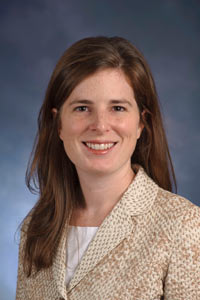 Sarah Beth Gehl, Class of 2002
Sarah Beth Gehl, Class of 2002
Doctoral Candidate
Andrew Young School of Policy Studies at Georgia State UniversityWhere does a double-major in English and mathematics land? In the social sciences, of course. My path has not been the most logical on its face, but each portion of my education and career has provided valuable skills in a variety of areas, beginning with the strong writing and critical thinking focuses of BSC's English and math programs. I enjoyed the mix of poetry workshop and differential equations, Dante seminar and abstract algebra, but struggled with "what's next" in my final year at BSC. I told a professor I thought I would like to work in a think tank. He asked what I meant by that. I said, I wasn't sure but it sounded interesting. He thoughtfully suggested that I apply for an internship with Operation New Birmingham, a nonprofit focusing on downtown redevelopment and revitalization. The internship sparked my interest in urban development and led to my enrollment in the urban planning and policy program at the University of Illinois at Chicago where I earned a Master's degree with a specialization in economic development.
Hoping to get closer to home upon graduating, I moved to Atlanta and began work as a tax policy analyst for the newly-formed Georgia Budget and Policy Institute—a real-live think tank. I spent the next seven years learning the ins and outs of Georgia tax policy, writing policy briefs, educating citizens on policy proposals, giving interviews, and attempting to convince state legislators that taxes can be a good thing. In 2011, I decided to pursue public policy differently—trading the trenches of the state capitol for the classroom at the university. I am currently in the joint doctoral program in Public Policy at Georgia State University and Georgia Institute of Technology where I am back to analyzing texts and writing papers.
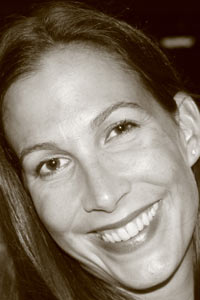 "The narrative is one thing—the real story extends much deeper than the words on the page, and when you've been able to deconstruct the dynamic is when you figure out the political reality."
"The narrative is one thing—the real story extends much deeper than the words on the page, and when you've been able to deconstruct the dynamic is when you figure out the political reality."Libby Greer, Class of 1997
Partner at Forbes-Tate
Public Policy Consulting Firm in Washington, DCLibby Greer can't remember exactly when the thought of entering politics came to her mind, but she knows she was always opinionated. "Politics is all about how your opinions play out in the public arena," says Greer. "Once I realized that, I think I just grabbed hold of the process and got on board."
After graduating from BSC, Greer worked for the Alabama Democratic Party as a fundraiser and was promoted to fundraising director in 1998 when Don Siegelman was elected governor. The following year, she volunteered for the Gore campaign in Alabama. Her next fundraising stint was for a political consulting firm in D.C. where she met U.S. Congressman Allen Boyd (D-Fla.), who surprised her one day with an offer to serve as his chief of staff at the age of 26.
As chief of staff to Congressman Boyd, Greer directed and oversaw hislegislative and political operations, including rallying 17 staff members in Washington, D.C., and Florida. -- 'Southern Magazine, Fall 2008
Working on the Hill showed me that truly effective advocacy was about building coalitions—identifying others' priorities and developing arguments to make those priorities work in our favor, whether or not the various motivations in play seemed to be copacetic. Learning to read and write at Birmingham-Southern taught me that skill. The narrative is one thing—the real story extends much deeper than the words on the page, and when you've been able to deconstruct the dynamic is when you figure out the political reality. Now that I am in private practice, advising clients on ways to advance their policy proposals, I know that discerning the motives of all the players is key, as is distilling every single argument for or against. In our current political system, no policy initiatives will advance without the right environmental conditions, even on the most granular level. The goal is to make my clients' positions safe for lawmakers to embrace.
And I have to say—because it needs to be said—I am stunned at how frequently I run across a bad writer. If I am grateful for nothing else, the professors who tore apart my papers in college top the list.
-
Religious Leadership
Although by no means the road most traveled, over the years, the English department has supplied a steady stream of graduates to divinity schools. Grappling with literature's questions about the human condition trains students for the kind of textual analysis and social service that are the foundation of religious leadership. At present we have no fewer than six graduates studying theology and ministry across the country.
 Miriam Smith, Class of 2009
Miriam Smith, Class of 2009
Associate Pastor
Alabaster First United Methodist ChurchBirmingham-Southern College taught me how to think. Being an English major was only a part of my experience at BSC, but all of my work for Leadership Studies, the Honors Program, and the Service-Learning department was enhanced by what I learned in my English classes. Renaissance poetry may not appear to have much in common with Shakers, online communities, or the people I got to know in West End, but my understanding of each was enhanced by what I knew of the others. Before I presented my final paper for my senior seminar at BSC, I had to travel to North Carolina to attend orientation for my graduate school program. I had applied, and was accepted, to Duke's Divinity School, where I earned a Master's of Divinity in 2012. Majoring in English and learning to think at BSC prepared me for the rigors of my graduate program, and ultimately for my vocation in the United Methodist Church, in ways I did not expect. Though I had to learn a new vocabulary in divinity school, I was well equipped to read and process and communicate my thoughts on the level Duke expected from their students. I was prepared to critically assess the texts assigned as well as the systems where they originated. BSC taught me how to read and interpret context just as well as any content that was assigned. Currently, I serve as a pastor in the North Alabama Conference of the United Methodist Church and rely on my critical reading and writing skills daily.
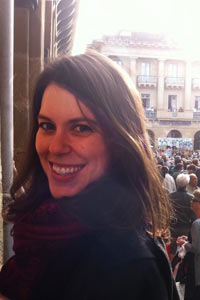 "Thanks to my undergraduate English major I have long been aware of the power of stories to make ideas, and lives, more intelligible. Now, I continue to use narrative as a tool to help others understand themselves and their place in the world."
"Thanks to my undergraduate English major I have long been aware of the power of stories to make ideas, and lives, more intelligible. Now, I continue to use narrative as a tool to help others understand themselves and their place in the world."Sara Doughton, Class of 2004
Yale Divinity SchoolAs a college sophomore I became an English major almost without thinking about it - I loved reading novels and poetry, and talking about those readings with interested and interesting professors and classmates. And I thought an English major would help me develop my reading, writing, and critical thinking skills in preparation for law school. Instead of studying the LSAT, though, I found myself drawn to literary study as a way of asking questions about meaning-making - the commitments revealed or betrayed by fictional characters, the language that poets use to talk about the particularities and mysteries of human existence, and how societies discern, create, and enforce cultural discourses (and what happens when people and communities try to challenge them).
Following graduation, thanks to Rotary International I had an opportunity to study at the Irish School of Ecumenics (Trinity College, Dublin), receiving an MPhil in Ecumenical Studies. I set off for Ireland with only an Intro to Christianity and Parables of Jesus course for preparation, yet soon found that my English training had well prepared me to consider questions like - how do we think about the lenses that people of faith bring to their sacred "texts" (scripture, tradition, etc.), and how do we navigate the different interpretations that emerge in a life-giving and justice-making way? Â My final project dealt with fundamentalism as a response to modern and post-modern commitments in the ecumenical movement, grounded in the story of an Alabama journalist who sets out to interview members of a Holiness (snake-handling) church and finds that, in discovering their stories, he is also discovering his own.
My fascination with how people discover more about their commitments, joys, challenges, and meaning-making practices or sources eventually led me to graduate school, specifically Yale Divinity School and the MDiv program. In addition to coursework, students participate in a number of internship or work programs, and there I've found that the power of words - and the need to be conscious of this power - serves as a constant. In my Clinical Pastoral Education (CPE) program--basically chaplaincy boot-camp--I found that the oncology patients I visited were often just as interested in walking me through their early childhood, familial relationships, adolescent exploits and coming-of-age tales as they were in talking about their illness and fears - although often these conversations became one and the same. Likewise, at the middle school where I help oversee the spiritual development program, students explore their social, emotional, and spiritual capacities and inclinations through personal narrative and stories of official and everyday saints who they look to as examples of human flourishing, even in the face of challenges and fallibility.
In many ways, I feel as if I am coming full circle as I move into my last year at YDS. As wonderful as traditional divinity school classes are, I especially love my religion and literature courses - Reading Poetry Theologically, Religious Themes in Contemporary Short Fiction - or the classes that make room for exploration of literature and theological inquiry. This summer I had a paper published on narrative therapy and pastoral care as a way of honoring the "sacred texts" of peoples' lives; I just finished a paper on Biblical allusions in Flannery O'Connor's "A Circle in the Fire," and am thinking about an essay on poetry, imagination, and moral formation for a moral theology class. I'm not sure what comes next - probably something in education, whether K-12, higher ed, or public religious education (like public theology - what I imagine Bread for the World as doing) - but I'm sure it will include thinking about the stories we tell, and the language we use about ourselves, the world, and whatever ultimate commitments we hold.
-
Non-Profit Management
English majors are adept at imagining creative and innovative solutions to longstanding problems. Many of our graduates have found meaningful and successful careers in the field of "organized philanthropy." As organizational directors and managers of outreach and development, our alumni apply their critical thinking and writing skills in the service of positive social change.
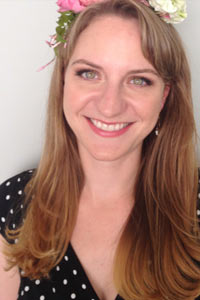 "As an English Major I learned to think and write critically, to do my research (and then do some more), to analyze a problem or challenge from all sides, and to approach my work in a thorough, detail-oriented way."
"As an English Major I learned to think and write critically, to do my research (and then do some more), to analyze a problem or challenge from all sides, and to approach my work in a thorough, detail-oriented way."Meredith Nguyen, Class of 2006
Associate Director of Development, San Francisco and Marin Food BanksWhen I was in college I had no idea what sort of career path I wanted to take. I pursued an English major because I was passionate about writing and Literature, and I just hoped my career would figure itself out later. As an English Major I learned to think and write critically, to do my research (and then do some more), to analyze a problem or challenge from all sides, and to approach my work in a thorough, detail-oriented way. In small ways and big ways, these skills have helped me significantly both personally and professionally since I left BSC.
After college, I worked for a small organization called Alabama Giving, and I began to learn the basics of grant-writing and continued to grow my research and communications skills. Shortly thereafter, I left for Chile to study Hispanic Literature on a Rotary Scholarship. When I returned to the states, I knew that I wanted to do something I was passionate about, so I looked for entry level jobs in non-profit organizations. I knew of the Food Bank from my time in San Francisco during a Service Learning Interim my senior year, so I applied and was hired as their Executive Assistant.
After a short period of time, I was promoted to work on the Grant Writing team. I felt like I had somehow lucked into the perfect career for myself. I got to write about a cause I was passionate about while raising money to help make a tangible impact in the community. Over time, my role grew and evolved, and I took on increased responsibilities and more leadership in our organization.
Now as the Associate Director of Development, I oversee three teams (Community Engagement, Institutional Giving, and Data and Donor Services) as a part of our development department. This year our department will raise over $14 million, making it possible for the Food Bank to distribute enough food for 100,000 meals each day to more than 225,000 low-income individuals in San Francisco and Marin.
I don't think that the BSC English Major prepared me for any specific career track. Instead the English Faculty gave me the self-awareness and skills I needed to adapt and take advantage of the varying opportunities that have been presented to me throughout my young career. They also always encouraged me to continue pursuing my passions, and those pursuits have never led me astray. For all of these reasons and more, I will always be grateful for my time as an English Major at BSC!
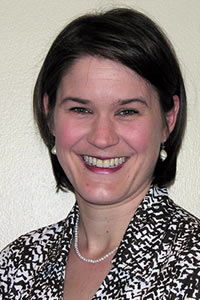
Erin Stephenson, Class of 2001
Vice President, Development
Foundation BirminghamErin was the featured speaker at BSC's Honors Day Convocation in 2012. She told students that their education has prepared them to tackle life's challenges, and that her own experience on campus helped her achieve success in community development and philanthropy, as well as in building relationships.
During her time on the Hilltop, she was active in service-learning projects that took her down the road to Fairfield and halfway around the world to Cambine, Mozambique, Africa. Erin joined the Community Foundation staff in 2005, and since then, she has facilitated gifts totaling more than $50 million, including the largest gift ever by a donor to the foundation of $5 million.
Her professional experience also includes membership in the Rotaract Club of Birmingham and 2012 class of Leadership UAB, and she serves on the YWCA's Junior Board as well as the board of the Alabama Planned Giving Council.

